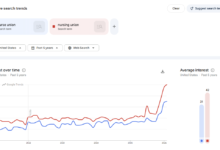Digitisation is ‘everyone’s business’, says CNIO

Nurses discussed the pros, cons and impact of digitisation and new technology in the nursing profession, at an event hosted by Nursing Times.
The Nursing Times’ second digital forum was held earlier this week, and featured talks on the future of health by experts from across the nursing profession.
“Digital transformation is everyone’s business”
Helen Balsdon
Opening the event, Nursing Times editor Steve Ford said that we are in an “exciting time” for the use of digital and other new technology in nursing.
“The shift in momentum we’ve observed in the last few years around the adoption of digital technology in the sector is continuing, as is the increasing involvement of nurses in it,” he said.
“This is an opportunity for nurses and midwives to come together, share ideas and collectively lead on shaping the digital technology agenda so that it directly benefits patient care and, of course, the profession itself.”
Helen Balsdon, interim chief nursing information officer (CNIO) for NHS England, discussed, in her keynote speech, the work done so far to digitise the profession – and what is on the horizon, describing the current time as one of transition.
This, Ms Balsdon said, included “creating the new NHS England”, which involved organisations like NHSX and NHS Digital being merged into it.
She mentioned the huge proportion of NHS organisations in England which have created a CNIO position, which she said now stood at 83% of trusts.
“Digital transformation is everyone’s business,” said Ms Balsdon.
“We’ve made huge progress since Ruth May asked that all NHS organisations have a CNIO, and we know that around 83% have one.
“That’s a good increase, but we also know we have lots of variation in that role, so there is more work to do.”
She mentioned that a priority for her office, going forward, would be the standardisation of the CNIO role across trusts to make sure they are all being given a meaningful voice for the profession.
Work, Ms Balsdon said, had also been done to make sure the digital transformation of the NHS was done equitably, pointing to funding by the Shuri Network – which brings together women of Black and ethnic minority backgrounds – of 20 placements for its members to attend digital health summer schools.
The CNIO continued that she was “passionate” about improving, via digitisation, nursing documentation.
“We know from workforce data that nurses spend around 25% of their time looking at documentation and using it, recording and retrieving that data,” she said.
“We need to reduce that time, harness the power of technology to reduce it and give our nurses more time at the bedside to do what they’ve been trained to do.
“I’m delighted to say we launched, last month, documents which set out the principles for organisations to plan what and how digital systems might help them with documentation.”
Ms Balsdon said that the guidance was applicable “no matter” the digital maturity of an NHS organisation.
“It is something for everybody,” she continued.
“It was designed as a start, and I hope nurses take the principles and have great conversations locally about ‘why this document’ and ‘what that document is’ – this is a cultural piece and it is the first of many things we’re looking at.”
Further, Ms Balsdon said she hoped digitisation could be used to help staff across the NHS and social care communicate better for a patient, hinting at the potential for a better shared digital record between the two.
Looking ahead, Ms Balsdon said the upcoming report from the Phillips-Ives review would include detail on the future of nursing and midwifery and their relationship with technology such as genomics, artificial intelligence (AI) and data science.
She continued: “We will be looking at what support educators need to make sure they are teaching for a digital world. Lots will come from this, and we’re already looking at a delivery plan.
“The digital nursing community has had the most amazing buy-in, it’s been phenomenal.
“Together, we can create amazing things. So, what’s next? We have work to do to create the new NHS England.
“But we’re already looking at how to build on the success we’ve had, and will standardise digital nurse leaders, and give them a career pathway.”
Professor Gemma Stacey, deputy chief executive of the Florence Nightingale Foundation, and former CNIO for England Professor Natasha Phillips also spoke at the event which also took questions from nurses in attendance.
On the second day of the forum, Donna Lamb, chief nurse for Sussex Community NHS Foundation Trust, spoke to attendees about future developments in virtual wards.
Looking ahead, more and more patietns could be electronically monitored at home with a mixture of wearable technology, as well as smartphones and other devices.
These would then inform clinicians, working remotely, who would coordinate their care – which could include home visits.
Ms Lamb discussed the drawbacks and the benefits; she pointed to the increase in demand for care due to an ageing population and worsening climate-related illnesses as reasons why they could be useful.
She also, however, acknowledged anxieties within nursing about a potentially higher workload for staff, a reduction in the quality of care, and the problems such a physical distance between clinicians and patients could cause.
This was followed by a session on AI featuring nursing academics, in which they discussed how nurses can – and should – get involved to ensure the profession’s needs are addressed by new technology.






